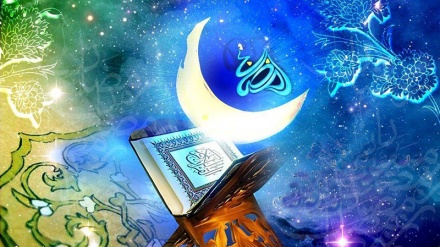Blessed Month of Ramadhan
Welcome to the 14th episode of the series “Blessed Month of Ramadhan”. May God accept your prayers, fasts, and other acts of worship!
As you know, modern science points out that eating less leads to health, longevity, and freshness. Imam Reza (AS), the 8th Infallible Heir of Prophet Mohammad (Blessings of God upon him and his progeny), has said: the human body is like a clean and fertile land. If necessary precautions are taken into consideration for irrigation, without any excessive watering that might result in inundation, it would lead to a bumper harvest and further cultivation, but if this land is neglected, weeds would grow all over making it useless.
What has reached us in relation to Islamic teachings and rulings such as fasting and prayers, are the legacies of the Prophet and the Infallible Imams through the untiring efforts of dedicated ulema who tolerated many hardships on the path to acquisition of knowledge and promotion of genuine Islamic teachings; even at times being forced to leave their homes and hearths. At times, the dedicated ulema have denied themselves of the most important necessities of life on the path of acquirement of knowledge. Because of their sincere intentions, they attained divine blessings. Asadollah Isfahani says about the famous Iranian scholar of hadith, Mirza Hussain Noori Tabarsi, known as Mohaddeth Noori: One day I went to holy Karbala in the company of Mohaddeth Noori. On the way, this erudite scholar named two books and pointed out that he was highly interested in them, but was unable to find them despite his extensive search. He was, however, confident that now on his visit to Karbala he would be able to trace these two books, by the grace of the Prophet’s grandson Imam Husain (AS), the Immortal Martyr of Karbala. We reached the holy shrine of Imam Husain (AS), and after performing the pilgrimage, we came out. Next to the shoe-keeping section, I saw a woman, who was holding two books. Mohaddeth Noori asked her what books she had. She said she wanted to sell them. We looked at the books, and to my surprise these were the very same books Mohaddeth Noori was searching for. He asked the woman about the price, and she said 22 Qirans. Mohaddeth Noori seemed short of money, and all the two of us could find in our pockets were six Qirans. We handed the six Qirans to the woman and he asked her to accompany us to the marketplace, where this erudite scholar sold his turban and cloak, but still the amount was short of the 22 Qirans. He was only left with his clothes and shoes. I asked him: How could a respectable scholar could go about without turban and cloak? He said this was not important, what was important were these two rare books. When we re-entered the courtyard of the holy shrine, we met some of our friends, who seeing the venerable Mohaddeth Noori in such a condition, immediately went out and procured a turban and cloak for him; and the rest of the problem of the two books was solved as well. The gist of this account is, a scholar of the stature of Mohaddeth Noori did not consider below his dignity to go about without turban and cloak for the sake of purchasing the two important books.
Let’s listen to and read ayah 112 of Surat-al-Houd of the Holy Qur’an, which states:
“So be steadfast, just as you have been commanded – you and whoever has turned to Allah with you – and do not overstep the bounds. Indeed He sees best what you do.”
In this ayah, God tells the Prophet to be steadfast, just as you have been commanded; to be steadfast in promotion of Islam and guidance of people; and in implementation of divine duties and Qur’anic teachings. Obviously, this steadfastness should not aim to please others, and should not be ostensible in nature. Also, it should not be for attainment of a post or accumulation of wealth. It should only be for the sake of compliance with the divine instructions. The divine instruction, although addressing the Prophet, also pertains to the rest of the believers, as is evident by the wordings of the said ayah. In other words, God calls on the neo Muslims, who were hitherto polytheists, to be steadfast in their acceptance of Islam, and not be deceived by the enemies, conspirators, ill-wishers, and dominant powers, as well as by their own whims; such as the urge to accumulate gold, silver, money, and posts; each of which can lure human soul. So keeping the faithful on the righteous path is a very important task, which was indeed a heavy responsibility for the Prophet of Islam and swiftly aged him. Based on a hadith, when this ayah was revealed, the Prophet pointed out: “It is time to make utmost efforts and to work hard.” As is clear by the words of the Prophet, the four important divine instructions have been made, urging steadfastness, purity of character, leadership of the faithful, and avoidance of overstepping the bounds; each of which are heavy responsibilities. Without implementation of these principles; overcoming the enemies, who have surrounded Muslims and maintain all cultural, political, economic, social, and military means is rather impossible.
The benefits of fasting are evident to all, such that the person, who fasts, maintains a better feeling toward his body and its systems after a few days of fasting. This achievement is made if the individual maintains moderation and resorts to a healthy dietary regimen, while eating a lesser amount of food. Eating less is not tantamount to weight loss. In fact, the person who fasts is recommended to eat sufficient food and maintain a balanced diet in order to have a healthy body. Currently, some youths eat insufficiently in order to lose weight. Such measures lead to malnutrition, osteoporosis, anemia, chronic headaches, dizziness, and fragility.
With due regard to the hadiths, if everyone had abided by all the health-related recommendations of Holy Qur’an and the instructions of the Prophet and the Infallible Imams of his Blessed Household, the rate of contraction of physical and mental ailments would have significantly declined. Moderation in consumption of food, in addition to leaving a positive impact on physical health, also highly contributes to mental and spiritual health.
In this month, some persons want to meet their daily need for food via the additional consumption of food. However, maintenance of an inappropriate diet lowers the appetite and leads to malnutrition in the long run. Eating less, and appropriate consumption of food brings about many benefits, and freshens body and spirit.
The Prophet of God considered eating less the chief remedy for all ailments. He noted: “If the residents of one home eat less, their house will be blessed.”
Modern science considers eating less a means for physical health, freshness of soul, and longevity.
AS/ME


